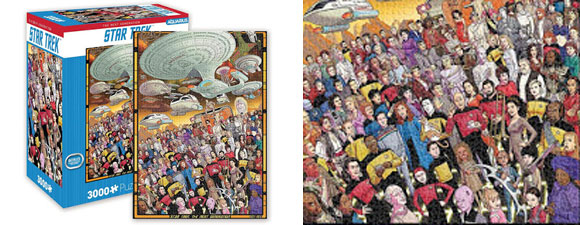Retro Review: Cost of Living
6 min readLwaxana Troi arrives to wed a man she’s never met, prepared to forego the traditional nude Betazoid ceremony, but unwilling to stop teaching Alexander about free thinking and mud baths.
Plot Summary: When the Enterprise destroys an asteroid on a collision course with an inhabited planet, the ship picks up parasitic particles that begin to feed on the ship’s hull. While the crew remains oblivious, Troi tries to counsel Worf and Alexander about respecting one another’s wishes, but she is interrupted by the news that her mother is coming aboard. Lwaxana intends to marry Campio, the Third Minister of Kostolain’s Conference of Judges – royalty – yet she has never met the man, only read his profile and communicated via subspace. Troi finds this behavior impulsive and is not comforted when Lwaxana announces that Alexander has been given too much responsibility; she invites the child to skip a counseling session and relax in a mud bath in a holographic representation of a free-thinking society. Lwaxana herself feels restricted by the master of protocol who has accompanied her intended aboard the Enterprise, who insists that Lwaxana must wear a family wedding gown and avoid intimate contact with the groom before the wedding. Meanwhile, minor power failures aboard the ship begin to escalate into more serious problems, and Data discovers that an unknown ooze has begun to appear on the ship’s machinery. LaForge determines that the ship picked up parasitic particles that are devouring a critical element in the Enterprise’s structure. He believes the particles can be convinced to return to their home asteroids, if only the ship can hold together long enough to reach it. As life support fails and the crew begins to lose consciousness, Data takes the ship back to the asteroid field, where he is able to beam the parasites away. With the ship safe, the wedding begins, but Lwaxana shocks everyone by arriving in Betazoid fashion – completely naked. This has the intended effect of scaring the groom off, and Lwaxana then insists that Troi and Worf join her and Alexander for a mudbath.
Analysis: How one feels about “Cost of Living,” I suspect, depends entirely on how one feels about Lwaxana Troi, who seems to generate more extreme reactions even than Wesley Crusher. I adore Lwaxana, so I really like this episode, yet I can’t argue with anyone who complains that the science fiction plot is weak, the holodeck scenes are ridiculous, and Worf’s domestic problems are taking up more than their fair share of series time. It’s all pretty silly, even the deadly ooze that LaForge politely describes as the waste from the parasitic particles digesting the ship…in other words, alien poop. But it’s all worthwhile just to see the faces of everyone at the wedding when Lwaxana walks in au naturel…Riker grinning broadly, Picard shaking his head as if it were only to be expected, Troi gaping, Worf shocked, Alexander proud, the groom horrified beyond words.
Obviously, this is an episode about the compromises people are willing to make for their families, the negotiations parents make to teach their children the independent values they want them to possess while at the same time hoping for a degree of obedience, the tradeoffs found acceptable or unacceptable to avoid being alone. When Troi practically stamps her foot and tells her mother that Lwaxana is preaching rebellion to Alexander just when Worf is trying to teach him responsibility, giving the boy mixed messages, Lwaxana replies that she gave Deanna plenty of mixed messages and Deanna still turned out deadly dull. One imagines that her parenting style was completely the opposite of Worf’s, other than the fact that Worf and Lwaxana can both throw a mighty tantrum when they feel that their opinions are being taken for granted by their nearest and dearest.
Troi’s bias seems to be with the father and his need for discipline rather than with the son, who is still testing boundaries with a man who did not raise him and is new to parenthood. In retrospect, it’s apparent that Troi and Worf are beginning to explore feelings beyond the platonic, testing the possibility of a more serious relationship than that of colleagues and friends with the added complication of a child who likes them both but doesn’t feel entirely safe with either. Alexander’s outburst to Lwaxana, that he misses his mother, is very telling – of course that’s what’s behind his lingering resentment of Worf, and perhaps of potential surrogate Troi as well – so Lwaxana doesn’t try to address him as an ambassador or advisor. She takes on the role of indulgent grandma and Alexander thrives in her presence even if his chores don’t get done. Lest anyone should forget that she is a trained diplomat and crisis negotiator, she calmly escorts the boy to safety when the holodeck falls victim to the malfunctions plaguing the ship. Have I mentioned that I love Lwaxana Troi?
Deanna, the calm, sensitive counselor, is at her absolute least tolerant dealing with her mother, yet it’s hard to blame her when Jean-Luc Picard isn’t far behind. At first he rages to Riker that he doesn’t want Lwaxana using his ship for her own purposes whenever she wishes, but when Riker tells him that she wants the captain to give the bride away, Picard is only too happy to agree. It figures that Riker is neither angered nor unnerved by Lwaxana Troi; he’s a fan of strong women and her flirting has never fazed him in the least. When it comes to dealing with Mrs. Troi, though, the real revelation is Worf, whom she insists on calling “Mr. Woof” though one suspects she’s had enough training as a diplomat to be perfectly aware that that’s not his name, and furthermore that it infuriates both Worf and Deanna. Worf may have trouble keeping his temper with his son, but he’s a model of restraint where Lwaxana Troi is concerned. Who can blame him for popping a holographic bubble with the mime inside? Worf’s scowling, growling countenance – he is not a merry man – is played for comic relief, yet there are serious undertones to the character’s behavior. For Troi’s sake, he puts up with her mother’s inanity, while at the same time learning what he must put up with from Alexander if he wants to keep the boy close, which it would seem despite all his gruffness that he does.
Oh yes, and there’s some business with parasites and the ship nearly blowing up. When I think about this episode in terms of the sci-fi, I can’t remember whether this is the one with the nanites or the Soliton wave or what – it’s certainly not a memorable tech crisis of the week. Picard would do the same thing again – put his ship and crew at risk to stop the asteroid threatening an inhabited planet – and run into the same unknowns – so there’s no sort of lesson learned. If there’s a moral, it’s either that e-Harmony has the same flaws in the 24th century that it has today, or that if you want to know how people really feel about you, you should walk into a formal event naked. The ones who really love you will follow you to a mud bath afterward.






